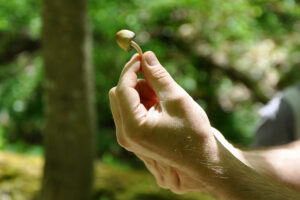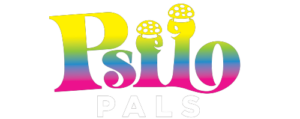Notable Elements
Psilocybin’s Impact on Creativity: Magic mushrooms contain psilocybin, which influences the brain’s serotonin receptors, leading to altered states of consciousness that may enhance creative thinking.
Neurological Effects on Creativity: Research shows that psilocybin decreases activity in the default mode network (DMN) of the brain, potentially fostering divergent thinking, a crucial component of creativity.
Breaking Through Mental Blocks: Psilocybin is reported to help in dismantling habitual thought patterns, allowing for more unconventional and innovative thinking, essential in creative processes.
Emotional Enhancement for Artistic Work: Many users report a heightened emotional sensitivity under the influence of magic mushrooms, contributing to more expressive and impactful creativity.
Inspiration from Psychedelic Experiences: Anecdotal evidence suggests that the vivid imagery and introspective insights gained during psychedelic experiences can translate into unique artistic expressions.
Use in Overcoming Creative Droughts: Magic mushrooms have been credited with helping individuals overcome creative blocks, reigniting the spark of innovation and creativity.
Acknowledging the Risks: It’s important to recognize the legal and health risks associated with psilocybin, especially given its classification as an illegal substance in many regions and its potentially unpredictable effects.
Importance of Controlled Environment: The setting and mindset significantly influence the outcome of a psychedelic experience, highlighting the need for controlled and guided use of psilocybin.
Future Research and Therapeutic Use: Ongoing research is exploring psilocybin as a potential tool for therapeutic and professional applications in creative fields, aiming to establish safe and effective usage frameworks.
Approach with Caution: While the creative potential of magic mushrooms is intriguing, their use should be approached with caution, considering the legal, health, and psychological implications.
Introduction
In the ever-evolving quest for creativity, magic mushrooms, also known as psilocybin mushrooms, have recently come into the spotlight. These fungi, known for their hallucinogenic properties, are being explored not just for their recreational use but also for their potential to unlock new realms of creativity. This blog post delves into the relationship between magic mushrooms and creativity, shedding light on both the scientific and anecdotal perspectives.
Understanding Magic Mushrooms
Magic mushrooms contain psilocybin, a natural psychoactive compound. When ingested, psilocybin is converted into psilocin, which then influences the serotonin receptors in the brain. This process is known to cause altered perceptions, emotions, and even visual hallucinations. Historically, these mushrooms have been used in religious rituals and spiritual ceremonies, primarily for their mind-altering effects.

The Science Behind the Creativity Boost
Recent studies have begun to demystify how magic mushrooms could potentially enhance creativity. Creativity, often defined as the ability to generate novel and valuable ideas, is a complex cognitive function. It involves several brain regions, including those associated with imagination, abstract thinking, and problem-solving.
Neurological Impact
Psilocybin’s interaction with the brain’s serotonin receptors leads to a unique state of consciousness. It’s hypothesized that this state can break down regular thought patterns, possibly leading to more unconventional and original thinking. Neuroimaging studies have shown that psilocybin decreases brain activity in the default mode network (DMN), which is involved in self-referential thoughts and mind-wandering. This reduction may lead to a state where the brain’s different networks communicate more freely and randomly, potentially enhancing divergent thinking, a key aspect of creativity.
Overcoming Mental Blocks
Creativity often requires stepping out of comfort zones and breaking free from habitual thinking. Psilocybin may help in dismantling these mental blocks, allowing individuals to approach problems and ideas from a completely different perspective. This can be particularly beneficial in artistic endeavors where innovation is key.
Enhancing Emotional Depth
Creativity isn’t just about thinking differently; it’s also about feeling. Many artists and creators report that psilocybin helps them tap into a deeper emotional reservoir, enhancing the emotive quality of their work. This heightened emotional sensitivity can lead to more expressive and impactful artistic creations.
Anecdotal Evidence
Beyond the realms of scientific research, there are countless anecdotal accounts from artists, musicians, and writers who claim that magic mushrooms have significantly boosted their creative abilities. From the Beatles to Steve Jobs, many have attributed some of their creative insights to their experiences with psychedelics.
A Source of Inspiration
For many creatives, the psychedelic experience itself, often filled with vivid imagery and profound emotional revelations, becomes a source of inspiration. The unusual sensory experiences and introspective insights gained during a trip can translate into unique artistic expressions.
Breaking Creative Droughts
Magic mushrooms have also been reported to help individuals overcome creative droughts. By providing a fresh perspective and a break from conventional thought patterns, psilocybin can reignite the creative spark in those who have been experiencing a block.
The Dark Side of the Mushroom
While the potential benefits are intriguing, it’s crucial to acknowledge the risks and downsides. Psilocybin is a powerful substance and its effects can be unpredictable.
Legal and Health Risks
In many parts of the world, psilocybin is classified as an illegal substance. This not only makes its use a legal risk but also a health risk, as unregulated substances may be impure or dangerous. Furthermore, individuals with a history of mental health disorders, particularly psychosis, are advised against using psychedelics due to the potential for adverse effects.
The Need for a Controlled Environment
The setting and mindset play a significant role in the experience and outcome of a psychedelic trip. Unsupervised use can lead to negative experiences, which is why controlled, and guided use is often recommended.
Psilocybin Research: The Future of Creative Therapy?
As the legal landscape around psilocybin slowly shifts, with some countries and regions decriminalizing its use, research into its potential therapeutic applications is expanding. This includes exploring its use as a tool for enhancing creativity, particularly in professional settings where innovation is crucial.

Also Read : Understanding Psilocybin: Effects of Magic Mushrooms on Mood
Controlled Studies
Controlled studies are being conducted to understand how, when, and for whom psilocybin can be safely and effectively used to enhance creativity. These studies aim to establish a structured framework for its use, minimizing risks while maximizing benefits.
Creative Problem-Solving Sessions
In a controlled environment, psilocybin could be used to facilitate creative problem-solving sessions, helping teams in various fields come up with innovative solutions and ideas.
Conclusion
Magic mushrooms hold a tantalizing potential for enhancing creativity, offering a break from conventional thinking and a deeper emotional experience. However, their use must be approached with caution, acknowledging the legal, health, and psychological risks involved. As research continues to unfold, we may find more structured and safe ways to harness the creative powers of psilocybin, potentially unlocking new horizons in the realm of human creativity. For now, the relationship between magic mushrooms and creativity remains an intriguing and complex topic, ripe with possibilities and cautions alike.

Hi! I’m Jacob Hawthorne, a passionate medical student dedicated to exploring the fascinating world of psychedelics, particularly magic mushrooms (commonly known as shrooms). With a deep interest in their therapeutic potential and profound effects on the human mind, I aim to provide accurate and evidence-based information about shrooms in the Canadian context.

